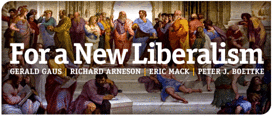Suppose we are convinced by Gerald Gaus’s proposal for a nonsectarian liberalism and resolve to form a political society on this basis. As I understand the proposal, we are to rank proposed political orders from the standpoint of each reasonable person in society. In carrying out this enterprise, we are urged not to be narrow-minded in deciding who is to count as “reasonable” for these purposes. Maybe we should say that each ordinary, noncrazy, nonretarded person who is not obviously bent on evildoing should qualify as a reasonable person whose views should not be ignored or brushed aside in the ideal theoretical construction of the just society. We then consider the set of proposals that is acceptable from the standpoint of every reasonable person. Maybe we can find uncontroversially reasonable ways of whittling down this set, but as a start, we should say that it would be illegitimate to impose a political order that is not acceptable from the standpoint of every reasonable person.
What makes a proposal acceptable from any one reasonable person’s standpoint? We cannot let each person from her own reasonable standpoint decide how nice the proposed political order must be to qualify as nice enough or acceptable. Some viewpoints that are reasonable by the standard we are employing will be lax about what counts as good enough and some will be very picky and finicky. Our political theory should not give undue weight to the views of the picky.
So, what is “acceptable”? One idea would be to say that a proposed political order counts as acceptable from your standpoint if you regard the outcome of having that order as morally more desirable than what would ensue from living under no political order at all. But this move privileges the baseline of anarchy. If someone objects that having any government at all is morally unacceptable, or if people cannot unanimously agree on any movement from anarchy, then we end up saying that no political order should be instituted. But it seems arbitrary to privilege anarchy in this way, and many of us will regard having no government at all as a horrible state of affairs.
I’m genuinely puzzled as to how a nonarbitrary baseline can be devised, in order to carry through Gaus’s project. Notice that once we are ranking different political orders, there is no good reason to presume that inaction should be preferred unless action can command unanimous assent. Some people regard with horror a minimal state, which does not enforce the duties (that some of us are sure) we all have to provide decent opportunities to all regardless of people’s initial circumstances in life, and some people regard with horror a nonminimal state, which violates (what some of us are sure are) sacred and inviolable individual property rights in order to redistribute resources and goods to the disadvantaged. In the face of this disagreement, if your political theory concludes that the nonsectarian solution is to have the minimal state, since reasonable people do not agree that the proposed enforced redistribution is morally acceptable, you have slipped an arbitrary baseline into your theory. I’m morally certain that Gerald Gaus does not make that crude mistake, but I am also genuinely puzzled as to how to solve the baseline problem within his theory.

